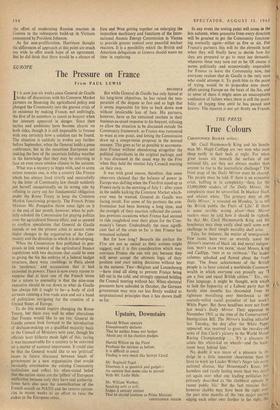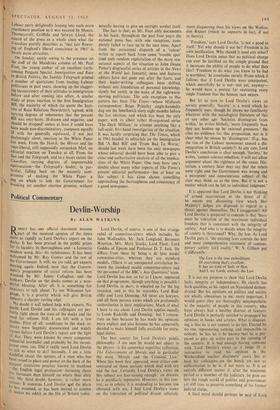THE PRESS
True Colours
CHRISTOPHER BOOK ER writes : Mr. Cecil Harmsworth King and his hench- man Mr. Hugh Cudlipp are two men who must sleep easily in their beds at night. For when great issues stir beneath the surface of our national life, are they not always readier than anyone to rise to the journalistic challenge? The front page of the Daily Mirror must be cleared. The people must be told. If there is an economic crisis, baffling in its complexity—then, for the 13,000,0000 readers of the Daily Mirror, the complexity must be unravelled. In blackest black and whitest white. 'The primary duty of the Daily Mirror,' it revealed on Monday, 'is to tell the British public the Facts of Life.' If there is some terrible wrong afoot—then Mirror readers must be told how it should be righted. So that Mr. Cecil Harmsworth King and his henchman may sleep easily abed until some new challenge to their simple morality shall arise.
Take, for instance, the matter of immigration. Few issues have ever so severely taxed the Mirror's reserves of black ink and moral indigna- tion. `DON'T SLAM THE DOOR,' shout Messrs. King and Cildlipp. 'THIS IS AN OUTRAGE.' The leader columns splashed and flowed about the front page. 'The finest achieVement of the British people is to have created a worldwide Common- wealth in which everyone can proudly say "I am a free and equal British citizen."' Etc., etc. Fine language, it might be thought, with which to lash the hypocrisy of a Labour party that in barely nine months has descended from its righteous moralising over Smethwick to the scarcely-veiled racial prejudice of last week's White Paper. But these headlines were not from last .week's Daily Mirror. They appeared in November 1961, at the time of the Conservatives' Immigration Bill. The Mirror's leading editorial last Tuesday, the day after the White Paper appeared, was reserved to greet the two-day-old news of Jim Clark's yictory in the World Motor Racing Championship . . . 'It's a pleasure to salute this whizz-kid on wheels—and the back' room boys behind him.'
No doubt it was more of a pleasure to in- dulge in a little innocent chauvinism than It'
have to work up Leader Writer's Anger (a'n oeco' .
national disease, like Housemaid's Knee. bur harmless and rarely lasting more than two day,l yet again over what one leading politician ha" privately described as 'the shabbiest episode in recent public life.' But the fact remains that- however shabby may have been the sight over the past nine months of the two major panic' edging each other ever further to the right, '11':
Thorneycroft, Griffiths and Selwyn Lloyd, the reactionary position as it was vacated by Messrs.
record of the press as a whole since what the Guardian prettily describes as 'that late flower- ing of England's liberal conscience in 1961' is barely more attractive.
On Sunday, surely owing to the presence on the staff of the Mandrake column of Mr. Paul Foot, the young author of an excellent forth- coming Penguin Special, Immigration and Race in British Politics, the Sunday Telegraph printed a number of quotations from leading Labour Politicians in past years, showing up the stagger- ing inconsistency of their attitudes to immigration before and after coming into office. A similar study of press reaction to the first Immigration Bill, the majority of which (to quote the Insti- tute of Race Relations Newsletter), 'agreed, with varying degrees of vehemence that the present Hill was over-hasty, ill-drawn and negative, and should be dropped' unless at least it could have been made non-discriminatory, compares equally ill with the generally equivocal, if not just deafeningly silent, reaction to the White Paper last week. From the Sketch, the Mirror and the once-liberal, still supposedly outspoken Mail, no editorial reaction on Tuesday at all. From the Sun and the Telegraph, and to a lesser extent the Guardian, varying degrees of impenetrable equivocation—the Telegraph's leader, in par- ticular, falling back on the masterly com- promise of making the White Paper a Peg on which to lash the Government for
't breaking yet another election promise, without actually having to give an outright verdict itself.
The fact is that, as Mr. Foot ably documents in his book, throughout the past four years the national press has, with one exception, com- pletely failed to face up to the race issue. Apart from the occasional dispatch of a 'colour' writer to report back from some 'trouble spot' (and such random exploitation of the more sen- sational aspects of the situation as John Deane Potter's disgraceful series of articles in the News of the World last January), news and features editors have not gone out after the facts; and their leader-writing colleagues have drifted, without any foundation of personal knowledge, slowly but surely in the wake of the rightward- moving politicians. The sole exception to this pattern has been The Times—whose Midlands correspondent Brian Priestley single-handedly dug out the Smethwick story eight months before the last election, and which has been the only paper, with its albeit rather ill-organised series 'The Dark Million,' to attempt anything like a full-scale, first-hand investigation of the situation. It was hardly surprising that The Times, which in 1961 headed its editorials on the Immigration Bill 'A Bad Bill' and 'From Bad To Worse,' should last week have been the only newspaper whose'editorial should have been able to give a close and authoritative analysis of all the implica- tions of the White Paper. One may have one's doubts about many other aspects of The Times's present editorial performance—but at least on this subject it has alone shown something approaching the thoroughness and consistency of a good newspaper.































 Previous page
Previous page